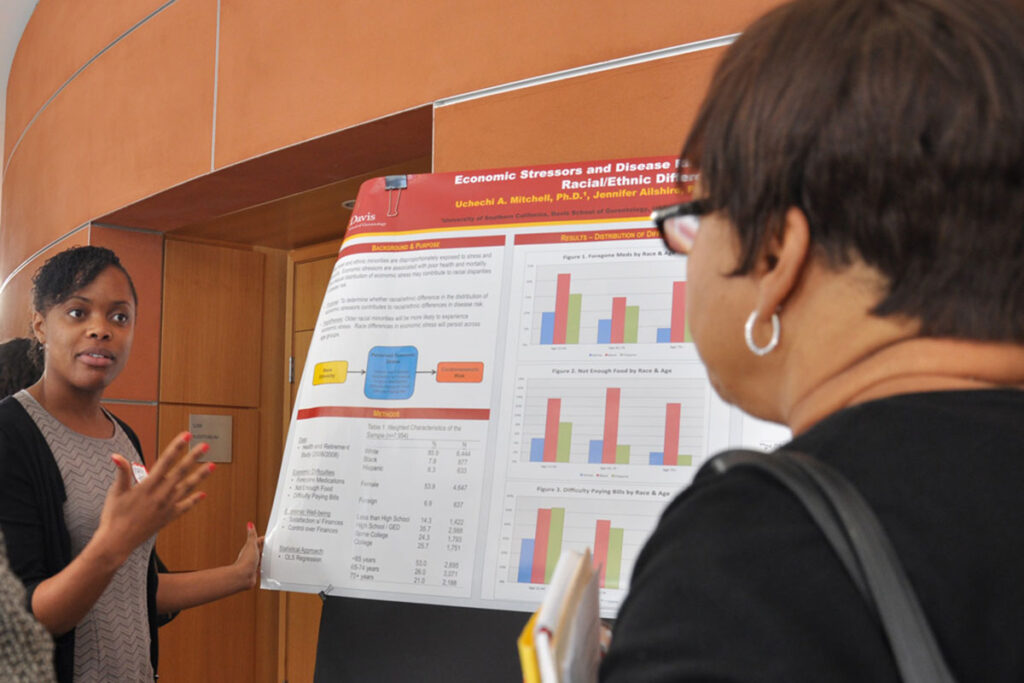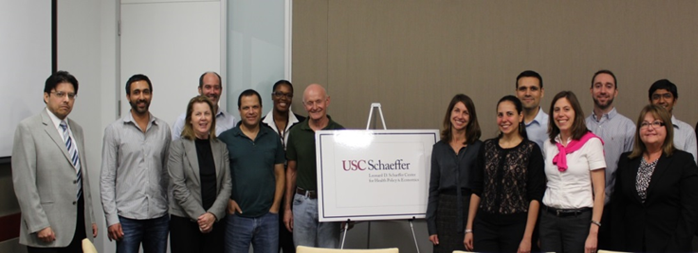The National Institute on Aging (NIA) has awarded a five-year, $3.6 million grant to fund USC’s Resource Center for Minority Aging Research (RCMAR), which supports junior scientists exploring health and economic disparities associated with dementia.
The RCMAR – housed within the USC Schaeffer Center for Health Policy & Economics – focuses on pathways by which social, behavioral and economic factors – as well policies and health systems – affect disparities in risk of dementia and disparities in the health, health care and economic outcomes of persons living with dementia. The center also helps launch the careers of underrepresented junior investigators, providing funding, mentorship, and tools to support their pilot research projects.
Now called the USC Alzheimer’s Disease and Alzheimer’s Disease Related Dementias Resource Center for Minority Aging Research, the center was established in 2012 and has supported 34 scholars from USC and 14 other institutions. Alumni of the program have received more than $11.2 million in research funding and have published more than 268 peer-reviewed articles. Many scientists have received academic promotions and met career goals.
Funding from the National Institutes of Health – which includes the NIA – has totaled $9.7 million. The center receives generous financial support from the USC Price School of Public Policy and Leonard Davis School of Gerontology. Other participating centers, schools and institutions include the Alfred E. Mann School of Pharmacy and Pharmaceutical Sciences, Howard University, Spelman College, Cal State Fullerton and other NIA-funded centers at USC including: Roybal Center for Behavioral Interventions of Aging, Alzheimer Disease Research Center, Center for Economic and Sociodemographic Study of AD/ADRD, and USC/UCLA Center on Biodemography and Population Health.

Developing researchers’ careers
Selected junior scientists receive funding for a one-year pilot project. This year’s cohort of three scholars, including two from Historically Black Colleges and Universities (HBCUs), are all female economists, who are underrepresented in their research discipline.
- Sidra Haye, postdoctoral fellow at the Schaeffer Center, will research the role of primary care physicians in diagnosing dementia and racial disparities in dementia diagnosis.
- Miesha Williams, associate professor of economics at Spelman College, will examine how economic shocks, such as the 2008 financial crisis, and other life events and activities may affect cognitive health.
- Jevay Grooms, assistant professor of economics at Howard University, will explore the impact of the opioid epidemic on persons with dementia and/or cognitive decline.
“The overarching goal is to develop the careers of underrepresented scientists who are in the early stage of this research area,” said Julie M. Zissimopoulos, a USC Price School professor and director of the university’s RCMAR. “An important part of that career development is establishing yourself as an independent investigator through grant funding. Through RCMAR pilot project funding we support scientists’ efforts to generate preliminary data for subsequent proposal development for larger grant awards.”
In addition to funding, the program provides scholars with access to the Schaeffer Center’s extensive data and analytical support. Scientists also receive mentorship from senior faculty, who work with junior scholars long after their stints in the RCMAR program.
“There are all those tangible benefits, such as getting the funding, but there are also intangibles, like having the funding on my resume,” Williams said of how the program helps her career. “If I’m able to get a publication, learn new skills in programming or research, or make new networking relationships – those are all benefits from working with USC RCMAR.”

Alumni take leadership roles
One doesn’t have to look far to find examples of how the program has advanced scholars’ careers. Two new leaders of the program – USC Price School Associate Professor Emma Aguila and USC Davis School Associate Professor Jennifer Ailshire – are former USC RCMAR scholars themselves.
“As a RCMAR scientist I benefited from the thoughtful feedback of experts across a variety of fields,” Ailshire said. “I also think I became a better advocate for my own research because the RCMAR faculty pushed us to explain why our findings were important and how these findings could be used to improve the health of individuals and communities.”
As principal investigator, Ailshire will help oversee the center’s Analysis Core, which develops new data and analytical resources for scientists and faculty. She co-leads the Analysis Core with Karen Lincoln, professor at University of California Irvine, and Mireille Jacobson, associate professor at USC Davis School.
Aguila, also a principal investigator, is in charge of the Research and Education Core that selects pilot study proposals and mentors researchers. She co-leads this group along with Eileen Crimmins, professor at the USC Davis School, and Maria P. Aranda, professor at the USC Dworak-Peck School.
Zissimopoulos is the contact principal investigator and heads the center’s Administrative Core, which provides leadership, communication and team science strategies. Prior to this recent five-year award, Zissimopoulos led USC’s RCMAR with Dana Goldman, dean of the USC Price School.
Black and Hispanic persons are at higher risk of Alzheimer’s Disease and other dementias, and little progress has been made in reducing those health disparities, Zissimopoulos noted. The center aims to help solve these problems by partnering with universities that have expertise in health equity issues, such as HBCUs.
“Being able to bring their expertise together with some additional resources is a powerful way of addressing some of these really complex issues,” Zissimopoulos said.
Upcoming events sponsored by USC’s RCMAR include this week’s International Conference on Aging in the Americas, as well as the Science of Alzheimer’s Disease and Related Dementia for Social Scientists program forthcoming in March 2024 with application opening this fall.
Sign up for Schaeffer Center news

You must be logged in to post a comment.